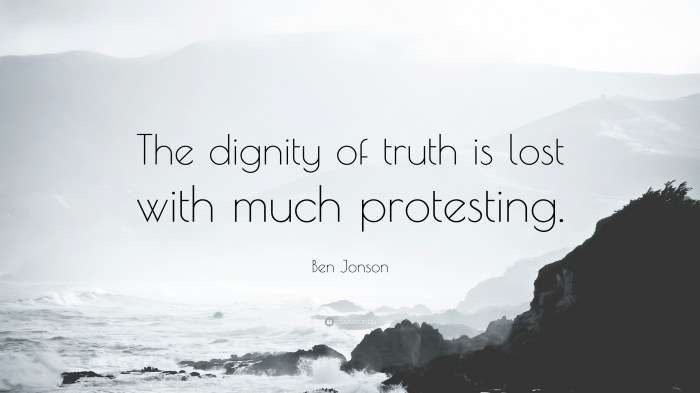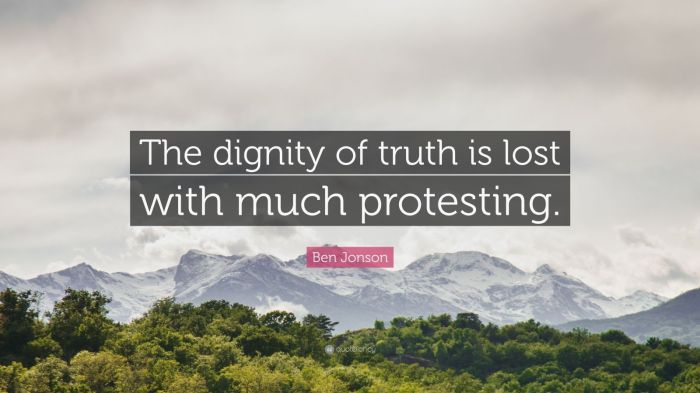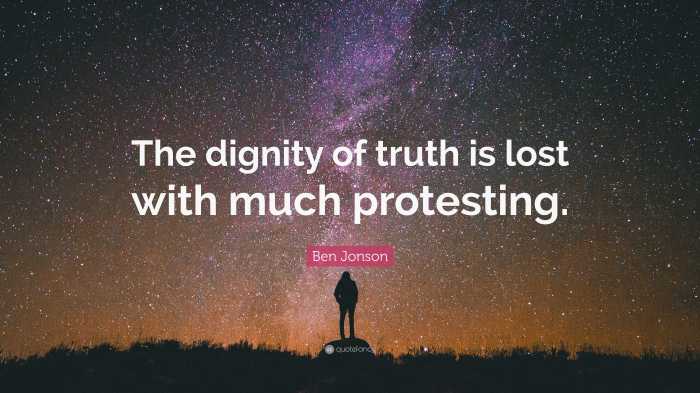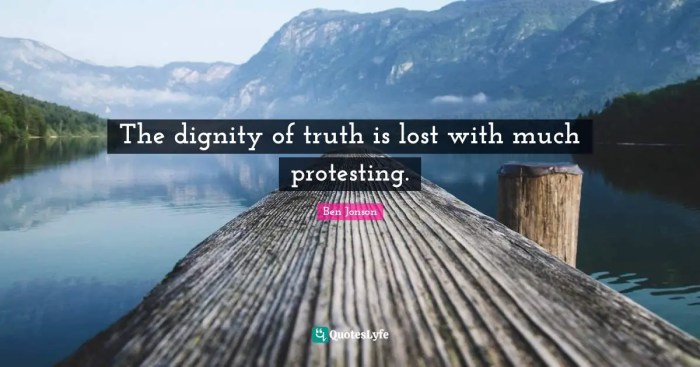The dignity of truth is lost with much protesting. Excessive protesting, driven by emotional appeals and unsubstantiated claims, undermines the credibility of truth and hinders the pursuit of rational, evidence-based decision-making.
This phenomenon has significant implications for society, potentially leading to the suppression or distortion of truth, with far-reaching consequences for individuals and communities.
The Value of Truth and the Impact of Protesting: The Dignity Of Truth Is Lost With Much Protesting

Truth is the foundation of any civilized society. It allows us to make informed decisions, build trust, and hold our leaders accountable. However, the value of truth has been eroded in recent years by excessive protesting.Protesting is a legitimate form of dissent, but when it becomes excessive, it can undermine the credibility of truth itself.
This is because excessive protesting often leads to misinformation and emotional appeals, which can make it difficult to discern the truth. For example, during the 2020 presidential election in the United States, there were widespread protests against the results. These protests were often based on unfounded claims of voter fraud, which led to a loss of trust in the electoral process.
The Role of Rationality and Evidence in Truth-Seeking, The dignity of truth is lost with much protesting
In order to find truth, we must rely on rationality and evidence. Rational thinking involves using logic and reason to evaluate information. Evidence is information that supports or refutes a claim. When we seek truth, we should always consider the evidence and evaluate it critically.Emotional
appeals and unsubstantiated claims can hinder the pursuit of truth. This is because emotions can cloud our judgment and make us more likely to believe things that are not true. For example, a politician may use emotional appeals to persuade people to support a particular policy, even if the policy is not based on evidence.
The Consequences of Ignoring or Distorting Truth
Ignoring or distorting the truth can have serious consequences. When people do not know the truth, they are more likely to make bad decisions. This can lead to social unrest, political instability, and even war.Throughout history, there have been many examples of societies that have suffered due to a disregard for truth.
For example, the Soviet Union collapsed in part because the government suppressed the truth about the country’s economic problems.
Promoting Truthfulness and Accountability
There are a number of things that we can do to promote truthfulness and hold individuals accountable for spreading misinformation.One important step is to educate people about the importance of truth. We need to teach people how to think critically and evaluate information.
We also need to teach people about the dangers of misinformation.Another important step is to hold individuals accountable for spreading misinformation. This can be done through laws, regulations, and social pressure.
Commonly Asked Questions
How does excessive protesting erode the dignity of truth?
Excessive protesting can undermine the credibility of truth by creating a climate of doubt and uncertainty. When truth is constantly challenged without sufficient evidence, it becomes difficult to discern what is true and what is not, leading to a loss of trust in the very concept of truth.
What are the consequences of ignoring or distorting truth?
Ignoring or distorting truth can have severe consequences, including the suppression of important information, the spread of misinformation, and the erosion of public trust. Historically, societies that have disregarded truth have often suffered from political instability, social unrest, and economic decline.
How can we promote truthfulness and accountability?
Promoting truthfulness and accountability requires a multi-faceted approach that includes education, media literacy, and social responsibility. Education can equip individuals with critical thinking skills and the ability to evaluate information objectively. Media literacy can help people understand how information is produced and disseminated, and how to identify bias and misinformation.
Social responsibility involves holding individuals and institutions accountable for spreading false or misleading information.


